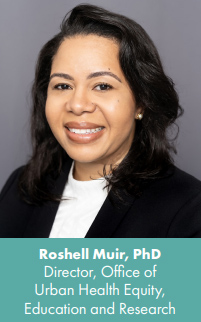Get to Know… Roshell Muir, PhD, Director, Office of Urban Health Equity, Education and Research

What is your official title at Drexel?
I’m director of the Office of Urban Health Equity, Education and Research (UHEER). I coined the acronym for my office. The name is quite long, and UHEER rolled off the tongue. I’m also a research assistant professor in the Department of Family, Community &am' Preventive Medicine.
Explain what you do in under 50 words.
As director of UHEER, I oversee strategy and scholarship in urban health equity and provide project management and mentorship. My biomedical research focuses on human immunology and infectious diseases, where I have 15-plus years of experience in flow cytometry and cell sorting used to drive multidisciplinary systems biology projects.
Who do you interact with most on a daily basis?
I interact with other faculty, professional and administrative staff, and graduate and medical students. I also meet with outside collaborators and often liaise with vendors who provide many of the resources and contracts for the lab machines we use.
What is your typical day like?
What I like about my role is that no day is the same. I mostly have a combination of to-do tasks, meetings and projects to complete. I generally start the day by replying to and crafting emails. I could have a full lab day training or mentoring students, or a combination of that and writing in my office. Through the UHEER office, I also have strategic planning meetings for projects or grants, as well as meetings to support other faculty and mentor students on their health equity research. I also lecture immunology graduate students and facilitate sessions for medical students. I lecture on mentorship for the Responsible Conduct of Research courses in the graduate school, the medical school and the University, so when these courses are in session, I have periods where I am teaching and traveling to the different campuses.
How do you see your work fitting into the big picture of the missions of the College?
My passion for advocacy and health equity drives the work I do now in the UHEER office and fits perfectly with the College of Medicine’s mission to “excel and innovate in education, research and delivery of compassionate care.” My hope is that my work in biomedical science and health equity will provide diverse and novel solutions. I also hope that with collaborative work we can advance agendas that benefit the College’s workforce and students, and create more opportunities for the community to attain their highest level of health.
What are your favorite and least favorite tasks?
My least favorite tasks would include any repetitive work. I find that my favorite projects are ones where I am more productive, where I have some creative oversight or input, and that I can influence and drive forward. These kinds of tasks, such as strategic planning, project design and troubleshooting, keep things interesting. Having new projects to work on, and collaborating with teams from different departments and other institutions, really helps to diversify my research and my skillset.
What is your educational and previous work background? How did those prepare you for what you do now?
Both of my postgraduate programs focused on virology and respiratory immunology. I did my postdoctoral work in the field of HIV medicine and germinal center biology. I continue to focus my research on germinal center interactions in health, viral diseases and vaccination, while expanding into evolving topics such as adjuvant discovery. Interestingly, before I started my master’s program, I worked as an assistant operations manager in a financial institution and found my love for project and organizational management. I also worked as an assay scientist in drug discovery at a large pharmaceutical company before entering my PhD program. Both these roles, while in different types of organizations, allowed me to gain “real-world” experience, something I think is beneficial to those pursuing an academic career.
My skills in project management have been invaluable, and I have recently enrolled in a Certified Associate in Project Management (CAPM) course at Drexel to prepare me to take the certification exam. In my role as director of UHEER, research project management is a core part of my leadership. All my training and work experience has culminated in preparing me for my current role.
What’s one thing you love about Philly?
I have a great interest in sports, music and culture, and Philadelphia ticks all three boxes for me. I regularly attend sporting events (go Phillies!), go to concerts to see some of my favorite artists — I recently saw Mary J. Blige — and I am always visiting a museum with my family and friends or going out to eat at many of the amazing restaurants in the city that serve food from all over the world.
Back to Top